For a Safe and Peaceful Home, Remember These 15 Feng Shui Principles!
Home Feng Shui is not only an important part of traditional Chinese culture but also key to creating a harmonious living environment. Following correct Feng Shui principles can bring peace and good fortune to the family. Here are fifteen important home Feng Shui principles worth understanding and valuing for every household.
First, the main door, as the energy entrance of the residence, is crucial. The main door should not directly face elevators, stairs, or long corridors. In Feng Shui, this is called "conflict" or the "Heart-Piercing Sword pattern," which can cause the home's energy to be drained. From an architectural perspective, such a design also affects the privacy of the home.

Secondly, the relative positions of interior doors require special attention. The entrance door should not directly face the bathroom or kitchen door, known as "seeing the toilet upon opening the door" and "seeing the stove upon opening the door," both considered highly inauspicious. Bedroom doors should also not directly face bathroom doors, kitchen doors, or the entrance door, and it's even inadvisable for bedroom doors to face each other. These layouts can easily lead to odor interference and psychological discomfort.

Furthermore, beams overhead are a common issue. Areas of frequent activity like the living room, dining room, and bedroom should not have beams directly above, as this can affect career and wealth luck and create psychological pressure. Similarly, it's best not to place a chandelier directly above the bed.

The "rushing road" or "Lu Chong" is another pattern to avoid. A road pointing directly at the main door, windows, or balcony creates strong negative energy, affecting family health. Architecturally, such a layout can also make residents feel insecure.
Other important principles include: the living room should not offer a view of all room doors and the kitchen stove; the dining table should not face the main door; the bed should not face the bedroom or bathroom door; the dressing table mirror should not reflect the pillow position; avoid having antennas, high-voltage poles, or other sharp objects outside bedroom windows; the desk should not face the window or the main door; there should be no withered trees in front of the door; the house should not be conspicuously taller than its neighbors; and avoid houses missing all four corners.

These Feng Shui principles not only contain ancient wisdom but also align with modern architectural and psychological principles. Through reasonable layout, we can create a living environment that is both comfortable and auspicious.

